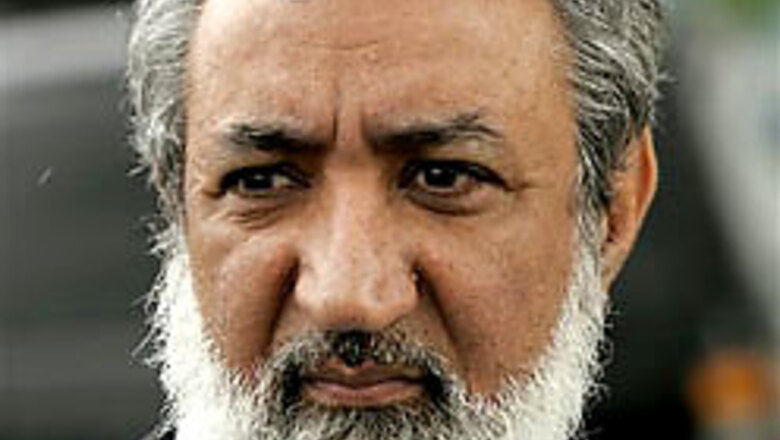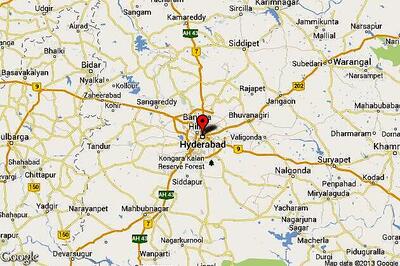
views
Toronto: Canadian authorities said on Saturday they had foiled plans for terrorist attacks in southern Ontario with the arrests of 17 people who were "inspired by al-Qaeda."
The FBI in Washington said the Canadian suspects may have had "limited contact" with two men recently arrested on terrorism charges in Georgia.
The Royal Canadian Mounted Police said they had arrested 12 male adults and five youths on terrorism-related charges, including plotting attacks with explosives on Canadian targets. The suspects were either citizens or residents of Canada and had trained together, they said.
"This group took steps to acquire three tons of ammonium nitrate and other components necessary to create explosive devices," said assistant Royal Canadian Mounted Police commissioner Mike McDonell.
He noted that this was three times the amount used to blow up the Murrah Federal Building in Oklahoma City. The April 19, 1995, attack killed 168 people and injured more than 800.
"The men arrested yesterday are Canadian residents from a variety of backgrounds. For various reasons, they appeared to have become adherents of a violent ideology inspired by al-Qaeda," said Luc Portelance, the assistant director of operations with CSIS - Canada's spy agency. However, he said investigators had yet to make any direct link to Osama bin Laden's terrorist network.
The men were due to appear later Saturday in a Toronto area courthouse, northeast of which was under heavy security with armed police officers on the roof and surrounding the building.
FBI Special Agent Richard Kilko in Washington DC, said there may have been a connection between the Canadian men and a Georgia Tech student and another American who had traveled to Canada to meet with Islamic extremists to discuss suitable locations for a terrorist strike.
Syed Haris Ahmed and Ehsanul Islam Sadequee, both US. citizens who grew up in the Atlanta area, were arrested in March.
"The FBI is aware of the ongoing law enforcement activity in Canada," Kilko said. "There is preliminary indication that some of the Canadian subjects may have had limited contact with the two people recently arrested from Georgia.”
Officials showed evidence of bomb making materials - including a red cellular phone that was wired up to what appeared to be an explosives detonator inside a black toolbox - a computer hard drive, camouflage uniforms and a door with bullet holes in it at a news conference Saturday.
The arrests were made Friday and about 400 officers were involved in the operation.
The Toronto Star reported Saturday that the men had trained at a camp north of Toronto and had plotted to attack the Canadian spy agency's downtown Toronto office, among other targets in Ontario province. Authorities refused to confirm those reports, but did say that contrary to other news reports, Toronto's subway system did not appear to be a target.
PAGE_BREAK
The 12 adults live in southern Ontario, or Toronto, Canada's financial capital and largest city. The men from Toronto are Fahim Ahmad, 21, Jahmaal James, 23, Asin Mohamed Durrani, 19, Steven Vikash Chand, alias Abdul Shakur, 25; those from neighboring Mississauga are Zakaria Amara, 20, Asad Ansari, 21, Ahmad Mustafa Ghany, 21, Saad Khalid, 19, Shareef Abdelhaleen, 30, and Qayyum Abdul Jamal, 43. Mohammed Dirie, 22, and Yasim Abdi Mohamed, 24, are from Kingston.
In March 2004, Ottawa software developer Mohammad Momin Khawaja became the first Canadian charged under the country's Anti-Terrorism Act. Khawaja was also named, but not charged, in Britain for playing a role in a foiled bomb plot. He is being held in an Ottawa detention center, awaiting trial.
The Canadian anti-terrorism law was passed swiftly following the Sept 11 assaults, particularly after bin Laden named Canada as one of five so-called Christian nations that should be targeted for terror attacks.
The other four countries, reaffirmed in 2004 by his al-Qaeda network, were the United States, Britain, Spain and Australian, all of which have been targeted in terrorist attacks.
The anti-terrorism law permits the government to brand individuals and organizations as terrorists and gives police the power to make preventive arrests of people suspected of planning attacks.
Though many view Canada as an unassuming neutral nation that has skirted terrorist attacks, it has suffered its share of aggression, including the 1985 Air India bombing, in which 329 people were killed, most of them Canadian citizens.
Intelligence officials suspect at least 50 terror groups now have some presence in the North American nation and have long complained that the country's immigration laws and border security are too weak to weed out potential terrorists.


















Comments
0 comment